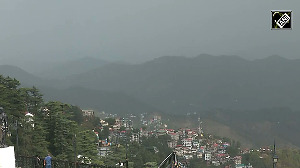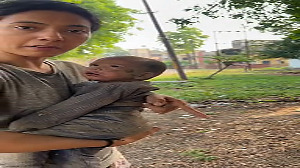Mohammad Shehzad was among the first Pakistani journalists to visit Muzaffarabad, the capital of Pakistan-administered Kashmir, most of which was reduced to rubble by the October 8 earthquake. What remains standing will probably have to be torn down and rebuilt owing to cracks and other structural damage. Relief work has been painfully slow and scarce. Nearly a week after the quake, Shehzad was horrified to witness a man still digging through the ruins of his house late at night for the bodies of his loved ones.
Six days have passed since the devastating earthquake shattered Muzaffarabad.
Most buildings in Pakistan Occupied Kashmir have been pulled down and those with cracks will have to be pulled down. In fact, entire Muzaffarabad needs to be rebuilt.
Power lines have been snapped, communication systems are down and thousands still await help.
Complete Coverage: Terror from the earth
Even Pakistan Army's SCOM, the only mobile service that operates within a three to four km radius is non-functional. The only means of communicating with the outside world is the satellite phone, a luxury not every Muzaffarabadi can afford.
Neelam Valley, which has no road-access, is the worst hit.
"We believe that casualty figures in the Neelam valley area could be around 12,000. The army is doing its best," Major Farooq, official spokesman of the Pakistan Army in Muzaffarabad, said.
The haphazard way the Pakistan government has handled the relief operations has led to widespread protests.
There are several places in Muzaffarabad where people are still trapped under layers of debris.
'Muzaffarabad no longer exists'
As we drove through Jalalabad Park, a man, Shabbir, invited our attention. Around 11 pm, he was trying to dig out a body from the wreckage of his home. "We have not received any help or aid from the government. We are doing everything on self-help basis," he lamented as he went about with his work.
Meanwhile, trucks continue to be looted on their way by irate mob. Poor logistical and bureaucratic backing and lack of security has resulted in 50 percent of the food material being wasted or stolen.
When the remaining food and other material does reach the quake-hit area, its distribution leaves a lot to be desired. There is no system in place to ascertain as to who needs aid and to what extent. Some families get excess of food, which they hoard, while others do not even get a milk packet.
No wonder hatred is profound among the people of Muzaffarabad and the surrounding villages against the President and the Prime Minister of 'Azad' Kashmir, who they claim fled from the scene immediately after the quake.
Victims from Jalalabad Park, which is barely 25 metres from the residences of the prime minister and the president, do not hide their anguish and anger as they chant slogans against the two men, who they claim never even bothered to enquire about them.
People believe that the damage could have been less had the government been more sympathetic to its citizens.
Bombs will not secure a nation. The number of bombs that a nation has is not an indicator of its development, they say.
In fact, the October 8 quake has exposed the state's failure to protect its citizens.
Complete Coverage: Terror from the earth







 © 2025
© 2025